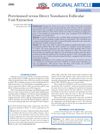 6 citations,
March 2017 in “Plastic and reconstructive surgery. Global open”
6 citations,
March 2017 in “Plastic and reconstructive surgery. Global open” Both pretrimmed and direct nonshaven methods are effective for hair transplants; pretrimmed takes longer but yields denser, longer hair.
 6 citations,
July 2015 in “Dermatology practical & conceptual”
6 citations,
July 2015 in “Dermatology practical & conceptual” Feily's method prevents scalp necrosis in dense hair transplants by allowing time for blood flow to return before grafting.
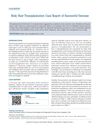 6 citations,
January 2013 in “Journal of Cutaneous and Aesthetic Surgery”
6 citations,
January 2013 in “Journal of Cutaneous and Aesthetic Surgery” A man with baldness had successful hair growth after transplanting body hair to his head.
 5 citations,
January 2023 in “Fertility and sterility”
5 citations,
January 2023 in “Fertility and sterility” Doctors are preparing to potentially perform uterus transplants in transgender women, considering technical, hormonal, and ethical factors.
 5 citations,
June 2019 in “British Journal of Dermatology”
5 citations,
June 2019 in “British Journal of Dermatology” Tofacitinib was more effective than apremilast in treating hair loss in a mouse model of alopecia areata.
 5 citations,
May 2005 in “Seminars in Plastic Surgery”
5 citations,
May 2005 in “Seminars in Plastic Surgery” Hair transplantation using micrografts and minigrafts is effective and safe for facial and scalp reconstruction with natural-looking results.
 5 citations,
November 2002 in “Aesthetic Plastic Surgery”
5 citations,
November 2002 in “Aesthetic Plastic Surgery” Storing hair follicles at -20°C keeps them good for up to 15 days, which may help with hair transplants.
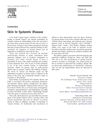 4 citations,
May 2008 in “Clinics in Dermatology”
4 citations,
May 2008 in “Clinics in Dermatology” Skin problems can indicate different diseases inside the body.
 4 citations,
April 2000 in “Plastic and Reconstructive Surgery”
4 citations,
April 2000 in “Plastic and Reconstructive Surgery” The document suggests fixing common hair transplant issues by combining artistic principles with plug reduction, recycling, and additional micrograft transplantation, while also potentially using arnica to help with post-operative swelling.
 3 citations,
August 2017 in “Oral and Maxillofacial Surgery Cases”
3 citations,
August 2017 in “Oral and Maxillofacial Surgery Cases” Using platelet-rich plasma and fat grafting to treat nerve pain showed promising results with no side effects.
 2 citations,
September 2019 in “Dermatologic Surgery”
2 citations,
September 2019 in “Dermatologic Surgery” The two-step procedure of fat grafting followed by hair grafting improves scalp and facial scar correction.
 2 citations,
August 2019 in “Journal of skin and stem cell”
2 citations,
August 2019 in “Journal of skin and stem cell” The study concludes that regulating apoptosis could lead to new treatments for various skin and hair conditions.
 2 citations,
June 2012 in “Journal of Cosmetic Dermatology”
2 citations,
June 2012 in “Journal of Cosmetic Dermatology” Hair transplant using beard hair made acne scars on cheeks less visible with minimal scarring in the donor area.
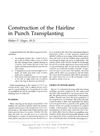 2 citations,
January 1985 in “Facial Plastic Surgery”
2 citations,
January 1985 in “Facial Plastic Surgery” The paper concludes that for natural-looking hair restoration, it's important to create an irregular hairline, use appropriately sized and angled grafts, and ensure a snug fit between grafts and recipient sites.
 1 citations,
July 2023 in “Cureus”
1 citations,
July 2023 in “Cureus” Some treatments for hereditary hair loss are effective but vary in results and side effects; new therapies show promise but need more research.
 1 citations,
July 2022 in “Clinical dermatology review”
1 citations,
July 2022 in “Clinical dermatology review” Hair transplantation is an effective hair loss treatment with two main techniques, requires careful planning, and can improve beard and eyebrows appearance.
 1 citations,
May 2021 in “International Journal of Dermatology”
1 citations,
May 2021 in “International Journal of Dermatology” Long hair follicular unit excision is effective for hair transplants, providing quick, natural-looking results with less pain but needs more time, staff, and skill.
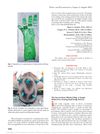 1 citations,
May 2015 in “Plastic and Reconstructive Surgery”
1 citations,
May 2015 in “Plastic and Reconstructive Surgery” The Sacred Heart Bilobed Flap is a surgical method for repairing small scalp defects with local flaps, relying on scalp elasticity and hair regrowth to hide any imperfections.
 1 citations,
February 2015 in “Clinical and Experimental Dermatology”
1 citations,
February 2015 in “Clinical and Experimental Dermatology” A man got six skin cancers within a year after a cell transplant for leukemia but was cancer-free 32 months later; skin checks are important post-transplant.
 1 citations,
January 2015 in “Journal of Aesthetic & Reconstructive Surgery”
1 citations,
January 2015 in “Journal of Aesthetic & Reconstructive Surgery” Hair transplantation is the best treatment for hair loss, with new technologies improving results, and stem cell and gene therapies may treat severe baldness in the future.
1 citations,
September 2007 in “Hair transplant forum international” Comparing hair restoration techniques is hard due to many variables and inconsistencies.
 1 citations,
April 1995 in “Annals of Plastic Surgery”
1 citations,
April 1995 in “Annals of Plastic Surgery” The Mercedes incision is a new hair restoration technique that creates a more natural look and has a high success rate.
 February 2025 in “Issues of Reconstructive and Plastic Surgery”
February 2025 in “Issues of Reconstructive and Plastic Surgery” Hair autotransplantation is the best treatment for androgenic alopecia.
 November 2024 in “BMC Surgery”
November 2024 in “BMC Surgery” Follicular unit extraction is an effective and minimally invasive treatment for male hair loss.
March 2024 in “Cosmetics” New regenerative techniques show promise for improving skin, healing wounds, and growing hair.
 January 2024 in “Authorea (Authorea)”
January 2024 in “Authorea (Authorea)” New punch technologies have improved hair transplant results over time.
 January 2024 in “JCEM case reports”
January 2024 in “JCEM case reports” This is the first known case of parathyroid cancer in a patient with Birt Hogg Dube Syndrome.
 June 2023 in “Plastic and Reconstructive Surgery – Global Open”
June 2023 in “Plastic and Reconstructive Surgery – Global Open” Exosomes may improve skin, scars, hair growth, and fat grafts in plastic surgery, but more research is needed.
 January 2023 in “Postępy Dermatologii i Alergologii”
January 2023 in “Postępy Dermatologii i Alergologii” Stem cells can improve wound healing, reduce scars, promote hair growth, rejuvenate skin, and enhance fat grafts in plastic surgery, but there are still some concerns.
 October 2022 in “The American journal of gastroenterology”
October 2022 in “The American journal of gastroenterology” Thymoma-associated multiorgan autoimmunity can cause liver damage and affects multiple organs, with limited treatment options and a generally poor prognosis.




























